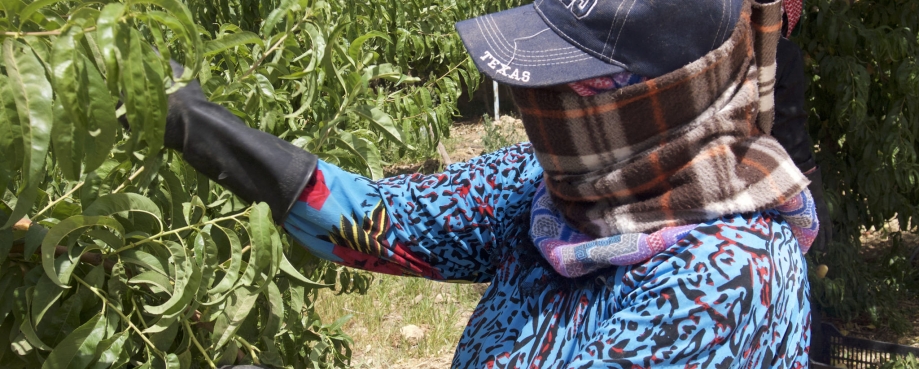
Our Head of Knowledge and Learning, Cindy Berman writes that this was a big week for news on Modern Slavery in the UK as Prime Minister, Theresa May, made three announcements: a review of the impact of the Modern Slavery Act one year on; a new £33m International Fund on Modern Slavery managed by the Home Office; and establishing an inter-ministerial task force. In this first of a three-part series, Cindy reflects on the Independent Review.
ETI's new Base Code Guidance: Modern slavery - practical guidance for brands and retailers.
The independent review of the Modern Slavery Act by a leading barrister, Caroline Haughey, has highlighted some good progress as well as some gaps.
As Caroline Haughey said:
“The Modern Slavery Act has set an international benchmark to which other jurisdictions aspire.”
Her findings show that law enforcement agencies are making use of new powers.
The number of prosecutions made and victims supported has increased.
Yet, at the same time, she found a lack of consistency in how law enforcement and criminal justice agencies deal with the victims and perpetrators of modern slavery.
She argues that this calls for better training, better intelligence and a more structured approach to identifying, investigating, prosecuting and preventing slavery, including learning from what works and what does not.
Caroline Haughey’s report also stresses the difficulties of detecting the crime of modern slavery because of the nature of the crime and the impact it has on survivors.
These findings make sense – but there are some notable omissions.
An extremely challenging time for companies
Over the past year, our members and other companies have been exposed for finding modern slavery in their supply chains in the UK.
Notwithstanding the horrendous circumstances in which workers have been found, this has been an extremely challenging time for companies.
They have learnt that their own auditing and due diligence systems can fail miserably. But they have also been challenged by the absence of government oversight, inspection and preventive action in some sectors.
They’ve struggled with not knowing exactly who to call or what to do when cases are suspected.
They’ve also struggled with knowing where their own responsibilities to act begin and end, and where the law needs to step in.
So there is still a long, long way to go in setting clear standards and processes for companies, as well as the government, in remediating victims.
For example, the new crime of illegal working under the Immigration Act pose some real threats and challenges to workers who are abused and exploited by their employers; who now, because of their irregular migration status, could end up being fined, imprisoned or deported.
Some of these issues are explored in Ben Rutledge’s blog on the new Immigration Act and I will also say more on this in my third blog in this series.
Section 54 of the Act: the Transparency in Supply Chains clause
Disappointingly, the report makes no reference to progress on Section 54 of the Act covering Transparency in Supply Chains (TISC).
That’s surprising, because from an ethical trade perspective, the Act has been something of a game-changer.
It has prompted companies to learn more about and take seriously the issue of forced labour and trafficking of workers for labour exploitation, and to recognise their own part in both preventing and potentially driving the problem.
Theresa May should be very pleased with this part of the Act, and next year, I hope the independent review will review progress on TISC.
Complying with the Act’s requirements
On the surface, the requirements of TISC are fairly limited.
Companies have to produce a statement that explains all the steps they are taking to ensure that modern slavery is not taking place in their supply chains, get it signed off by a CEO or senior Director and publish it on a prominent place on their website.
To date, as I’ve highlighted in a previous blog, very few companies are in compliance with these basic requirements.
However, what lies behind the statement, is what matters.
Companies know they will be held to account for the extent to which a company demonstrates how seriously it takes this issue, and the quality of their actions.
That’s why many of our members, and other companies, are taking this extremely seriously. And why it has prompted a lot of soul-searching and re-thinking of business models, policies and practices.
They are re-thinking their due diligence processes, and are starting to see the value of partnerships with key stakeholders – the most important of which should be organisations representing or acting on behalf of workers themselves.
It’s still too early to tell whether this soul-searching will translate into real action and changed business practices.
We will need to see whether companies can demonstrate the real difference this makes to workers that are either at risk, or are victims of modern slavery practices and processes.
Let’s hope that the next independent review will be able to show demonstrable progress in this area.
The next two blogs in the series
The second part of Theresa May’s announcement is a new £33m international fund to tackle modern slavery. I have some thoughts about this, and will air them in my second blog.
And importantly, I’ll also blog on why the establishment of an inter-ministerial task force is exactly what’s needed, provided it does what it needs to do: establish coherence across government of its laws, policies and practices.
So there’s a lot more to say on this too…
Download ETI's human rights due diligence framework here
The photograph of a Syrian fruit picker in Jordan is courtesy of the ILO and is for illustrative purposes only. It does not relate to any incidence of modern slavery.
